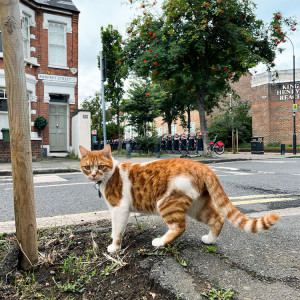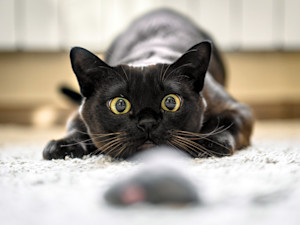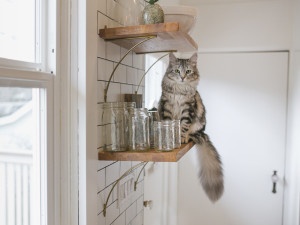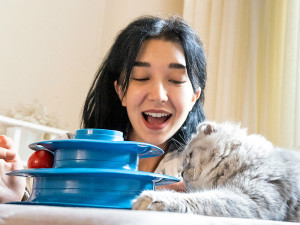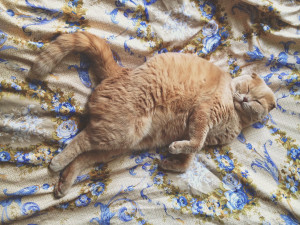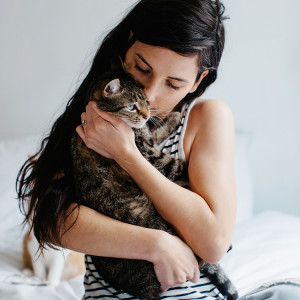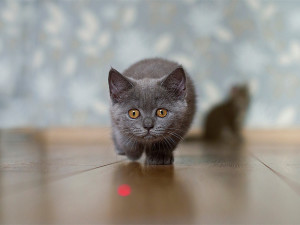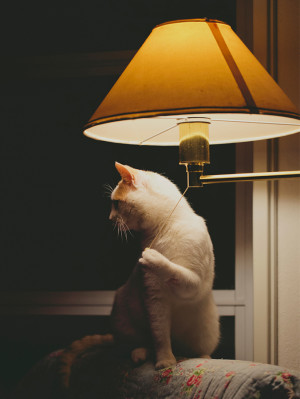Creepy or Cute? Discover the Truth About Why Cats Bring You Prey
Contrary to popular belief, it might not be a ‘gift’ at all...
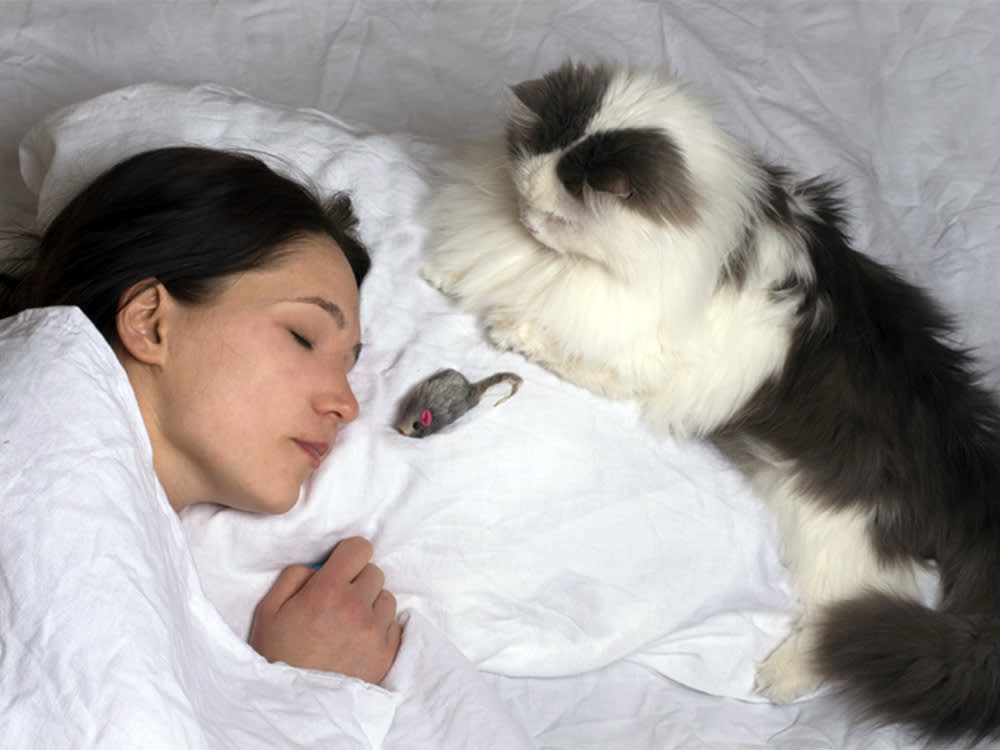
Share Article
Have you ever woken up to the dismembered body of a mouse on your pillow and wondered if you’re still having a nightmare? You’re not alone. One of the more unsettling behaviours that our usually adorable and totally perfect cats display is bringing home dead (or sometimes even live or partially alive) animals. Whether it’s a mouse, bird or other small creature, this ‘gift-giving’ can be both confusing and distressing for cat parents.
While 70 percentopens in new tab of domestic cats live an indoor-outdoor lifestyle in the UK, not all of them will exhibit this behaviour, despite still retaining the predatory instincts of their wild ancestors. In fact, lots of cats will be happy to just chase and ‘hunt’ wand toys, electronic toys, kicker toys and anything else they can get their paws and claws on. If you are one of the unlucky (or lucky, depending on how you look at it) pet parents whose cat brings them prey, understanding the natural instincts, learnt behaviours and human-cat relationship dynamics behind it can help make it a little easier to bear.
Why your cat brings you prey
Instinctual behaviour
Despite approximately 12,000 years of domesticationopens in new tab, cats still retain many predatory behaviours from their wild ancestors, when survival was dependent on their ability to catch and kill prey. When they were domesticated all those thousands of years ago, cats were primarily kept as pest controllersopens in new tab – meaning even your pampered house cat is descended from the most adept hunters. Cats come equipped with lots of specialised skills and adaptations for the job of hunting, too: sharp teeth and claws, lightning-fast reflexes, excellent nighttime vision, superior hearing, speed and power.
In a world where a cat doesn’t receive food from their pet parents and can’t scavenge, like in the case of strays, they would actually need to make as many as 10 to 20 kills per dayopens in new tab in order to survive (something worth reminding them as they turn their nose up at an offering of gourmet cat food). So when a cat catches prey and brings it home, they are simply exhibiting their natural hunting behaviour. The fact they live in a domestic environment and receive everything they need on a plate – literally – does not erase these instincts; instead, it just provides a different context in which to express it.
A safe space
The first thing to consider is whether your feline companion is actually bringing you the dead animal, or you just happen to inhabit the space they’ve brought it into. Cats Protection explainsopens in new tab that the main reason why cats bring these ‘gifts’ home is because “their home is where they feel safe and secure”. When cats catch prey, they may not want to eat it or leave it where other animals could steal it from them, so they bring it back to their core territory where they know they can eat it undisturbed, or store it safely for later – and this core territory may include your bed, even if them putting it there is actually nothing to do with you. While this doesn’t make their kill a gift for you per se, it can still be considered a sign of love, as it shows they feel safe with you.
Resource sharing
Wild cats will also often share their prey with other members of their social groupopens in new tab. This behaviour strengthens social bonds and ensures that weaker or younger members of the group have enough to eat. If your cat is bringing you prey, it could be because they view you as a member of their social group; when they share their ‘kill’ with you, it may be because this is part of their feline cultureopens in new tab.
Attention-seeking behaviour and boredom
Cats are known to engage in various behaviours to get their pet parents’ attention, from morning meows to zoomies, attention-seeking at night, biting, pushing things off the table and scratching furniture. So bringing you a dead animal might be a way for your feisty feline to elicit a reaction from you. Your reaction – whether positive or negative – can reinforce this behaviour as your cat might learn that bringing home prey leads to a significant response, thereby encouraging them to repeat it.
Some domesticated cats also lack the mental and physical stimulation that their wild counterparts receive, and hunting and bringing home prey can be a way for them to relieve boredom and satisfy their natural urgesopens in new tab, allowing them to engage in activities that are instinctually fulfilling and mentally stimulating.
Myths about why your cat brings you prey
Teaching
In the wild, mother cats teach their kittensopens in new tab how to hunt by bringing them dead or injured prey. This process is crucial for the kittens’ survival, as it helps them learn the necessary skills to hunt on their own. A common theory is that when a domestic cat brings dead animals to their human parent, they’re attempting to share this vital survival skill and teach you how to hunt. However, while some sources suggest this is not the caseopens in new tab, others indicate that this desire to teach may well play into their decisionopens in new tab to bring you prey. Unfortunately, as we can’t ask our cats why they do what they do, the jury is still out on this one.
Gifts
Another popular theory is that cats may bring dead animals to their pet parents as a gift that offers recognition and appreciation for providing them with food, shelter and care. But the current thinkingopens in new tab from animal behaviourists is that this is not the case.
Why do some cats play with their prey?
Cat parents sometimes see their cat playing or ‘toying’ with their prey. There are a number of theories about why this might be. Battersea Dogs & Cats Home suggestsopens in new tab it may be due to your cat trying to confuse the prey and tire them out, thus making it much easier to kill and reducing their chances of getting injured. Another theoryopens in new tab points to the idea that it allows cats to hone their hunting skills, practice coordination and maintain physical fitness. It could also serve as a form of stress relief for indoor-outdoor cats who may not have as much opportunity to express their natural instincts in a traditional hunting environment.
If my cat is hunting, does this mean they’re hungry?
Don’t worry, hunting is not a sign that your cat doesn’t like the food you provide or isn’t eating enough. Battersea explainsopens in new tab that it’s just down to the individual cat’s personality and experiences. “A bold, confident cat with lots of experience of going outdoors may need more than their basic ‘resources’ to feel satisfied and are therefore more likely to hunt for stimulation. Alternatively, a shy, quiet cat who is not a big fan of the outdoors may be happier being at home where all their essentials are nearby.”
What to do when your cat brings home dead or live animals
It’s important not to punish your cat for catching wildlife or bringing their prey home, as they won’t understand what they’ve done wrong. As hunting is a natural instinct for cats, shouting at them won’t deter them from doing it again, and will only cause them stress, which could lead to other unwanted behaviours. If your cat does bring mice, birds or other animals home, try not to react and instead follow this advice from Cats Protection.
If the animal is dead, safely get it away from your cat, as if your cat eats it they could get an upset stomach. For small animals such as mice, rats, rabbits, hedgehogs and small birds, double bag the animal and place it in your general household bin outside. Wear gloves and wash your hands thoroughly afterwards. For larger animals, contact your local authority for advice.
If the animal is alive, keep your cat in another room so they cannot get to it, then gently encourage the animal out of the house. Most animals will naturally find their way back outside if they have a clear route. Keep your cat indoors for a little while after the animal has gone outside, to give it a chance to get to safety and avoid your cat catching it again.
If the animal is injured, contact the RSPCAopens in new tab in England and Wales, the USPCAopens in new tab in Northern Ireland, or the Scottish SPCAopens in new tab in Scotland for advice.
How to stop your cat from bringing you dead or live animals
If cleaning up carcasses isn’t your thing, or you’re worried about the impact of your cat’s hunting behaviours on wildlifeopens in new tab, there are a few things you can try to reduce or stop this behaviour, but there’s no guarantee they will work.
Although your cat’s hunting is not usually because they’re hungry, ensuring you’re providing food with a high meat content could help stave off their desires to hunt and kill.
Provide food in multiple small portions throughout the day to mimic the feeding patterns your cat would have in the wild – try puzzle feeders or automatic feeders if you’re out the house during the day.
Find an outlet for your cat’s natural instincts and get out their pent-up energy by increasing hunting-style play at home using wand toys, kicker toys or laser pointers.
Consider keeping your cat indoors during their prime hunting hours when prey are more active, eg dusk and dawn.
While the sight of a dead animal brought in by your cat can be unsettling, it’s important to understand that this behaviour is rooted in a cat’s natural instincts, and that it is part and parcel of all the weird and wonderful aspects of being a cat parent. If it makes you feel better, you can still pretend it’s a gift that they’ve brought you out of love.
Ro Elfberg
Ro is Kinship UK’s Senior Editor. She has previously written and copy-edited for British Vogue, Glamour and DICE. When she’s not being manipulated into dishing out Dreamies to Kobe the cat, she spends her free time trying to convince her snake, Butters, to wear a tiny hat.
Related articles
![dark-haired woman hugging cat that has imprinted on her]()
10 Signs Your Cat Has Imprinted On You
Feeling like you have a little shadow these days? A cat behaviourist explains why that’s happening
![Two cats in a living room that appear to be arguing.]()
Me-OW! Should I Break Up a Cat Fight?
Between actual cats...
![A kitten sneaking up on a laser pointer with big, interested eyes.]()
Get to the Point: Can Cats Play With Laser-Pointer Toys?
People have strong opinions about this cat toy. Here’s what you need to know
![White cat switching on lamp on couch]()
Why Does Your Cat Wake You Up at Night?
You want to sleep, your cat wants to party. Here’s how to deal with it

